WE have been led to believe that smashed coral is our fault – that when it is lying on the sea floor as untidy piles of grey it is because of catastrophic human-caused global warming. But just maybe coral bleaching and cyclones are natural, and not even increasing in extent.
I visited four reefs during my recent adventures off Bowen. One of these, the reef fringing Middle Island, has been very badly damaged by cyclone Debbie, which hovered over Bowen in April 2017. 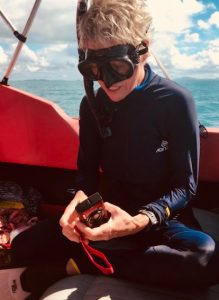
Just two years later much of this reef is unattractive – but certainly not desolate.
After gearing-up I jumped over-board from The Skipper’s boat with my little red Olympus (TG-5) camera on Monday – and my new snorkelling buddy Matt.
Every time I stopped swimming, watched, and waited I saw something special swim past.
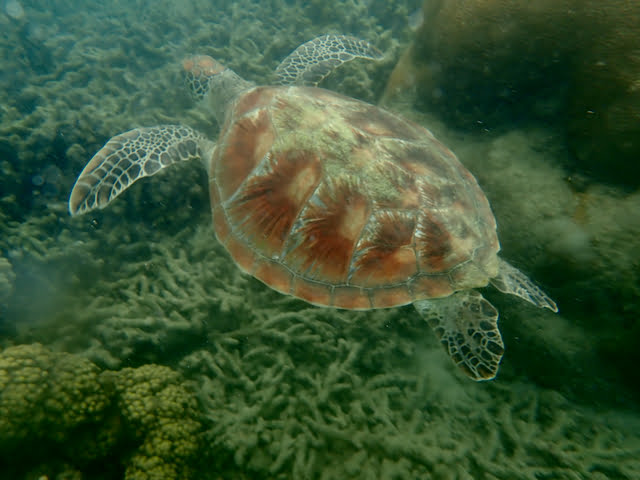
There were also large, colourful parrot fish. But I didn’t manage to capture them on this short video – my first attempt at underwater movie-making.
As I snorkeled sometimes the backdrop was broken coral. Other times I swam over meadows of algae. But I never had to swim far before seeing something special – like a mushroom or staghorn coral. They were often solitary: the very early stages of regeneration at an otherwise often ugly reef.
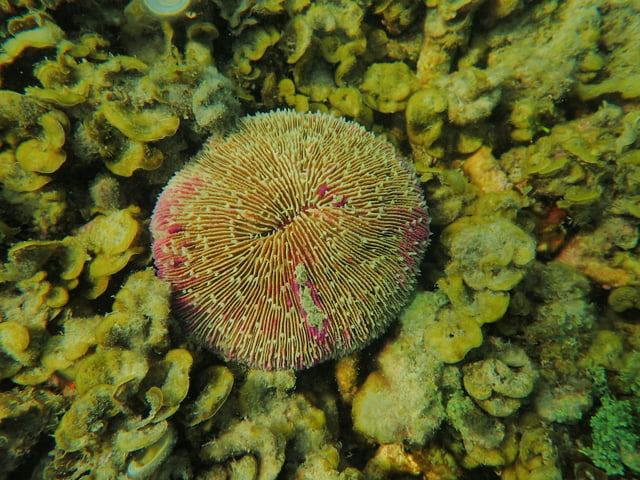
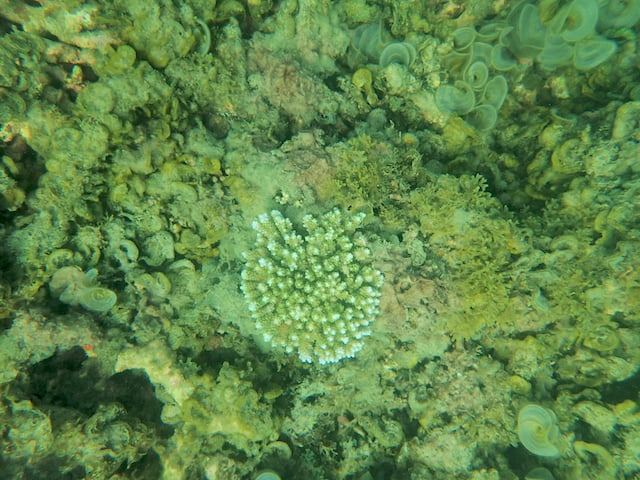
Occasionally I would stumble on an area of faster growing soft coral with sponges.
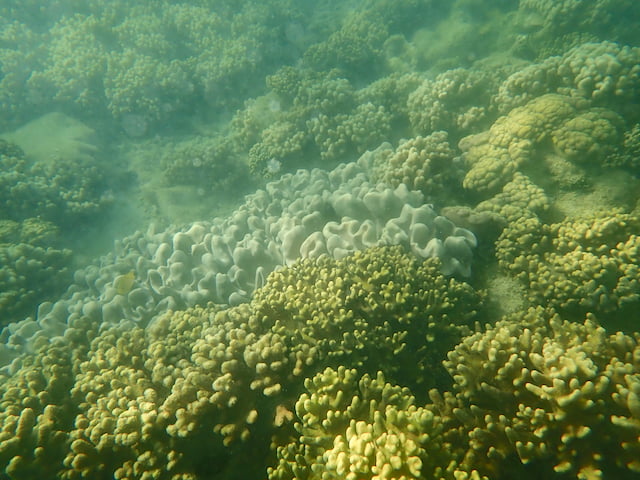
That the cyclone had smashed large Porites coral clear in half gives some idea of how powerful it was.
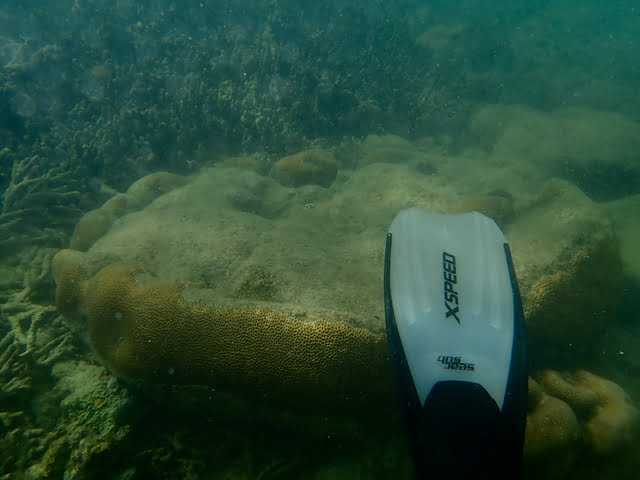
But even delicate black feather corals are coming back … one at a time.
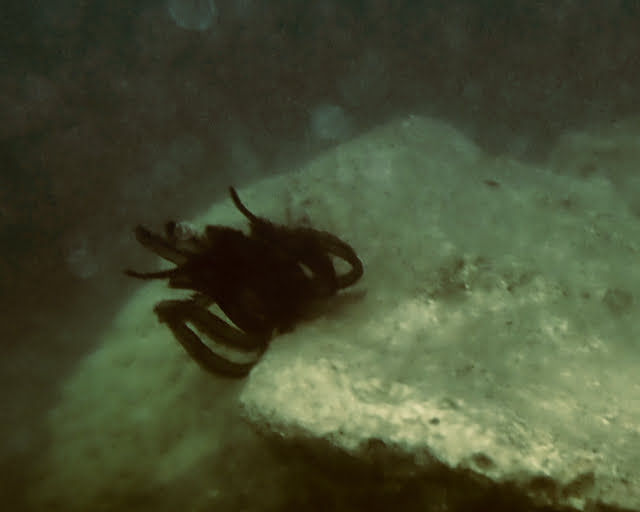
********
The first/feature photo is of me (Jennifer Marohasy) getting ready to jump in, with a view across to the north eastern edge of Middle Island, off Bowen, on 22 April 2019; photo credit John Barnes.
The first link embedded into this post is from the Bureau’s website suggesting a declining, certainly not increasing, trend in the incidence of cyclone. I’ve just downloaded this page and am archiving it here: TropicalCycloneTrends-20190424
Also, it should be noted, that the Bureau did overhype the category for Cyclone Marcia, as I detailed in an article for On Line Opinion, also archived here: CycloneMaricawasnotcategory5-Queenslanders . The Bureau were much more accurate when it came to reporting of Cyclone Debbie.

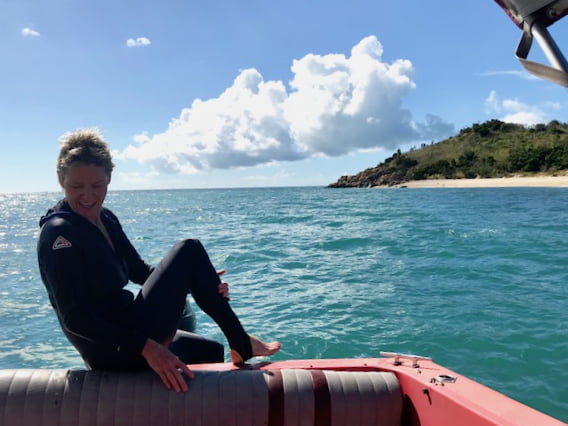
 Jennifer Marohasy BSc PhD is a critical thinker with expertise in the scientific method.
Jennifer Marohasy BSc PhD is a critical thinker with expertise in the scientific method.

Dead coral is just an open niche waiting to be populated.
Thank you Jennifer and Debbie. You ladies rock! Cheers! from Fran.
Thank you for your truthful reporting. Have you dived on the popular snorkelling spots in the Whitsundays at all? I understand there is quite a bit of cyclone damage, but also some places virtually undamaged.
It not dead! Coral propagates when branches break in storms and spread in the photic zone and grow new reef in places not viable before.
These fringing reefs have been affected by cyclones since time immortal. The following text is from a Newspaper report dated Nov 03 1961:
“Turbidity as a factor primarily responsible for the paucity of corals on the mainland is dismissed, because the water at the localities where coral was found was just as turbid as at other localities where coral was absent. However, salinity at mainland localities where coral was found are removed from the influence of large river systems. At Coral Point, a number of dead ‘Acropora’ colonies were observed in pools.
Mr. J. Dent of Mackay, has given an account of the deluge in January 1951, which was responsible for the death of this coral. He writes ‘about sixty inches of rain fell over about three days. There were some particularly heavy downpours ‘when the registration would be well over an inch an hour. The fresh water run-off was phenomenal. From the amount of damage in evidence I would hazard a guess that all creatures at all sensitive to the presence of fresh water perished. In some of the pebbly coves they were knee deep. In some sections sea slugs and sea cucumbers predominated. In others it was mutton fish whilst in others it was octopi … the coral was literally blanketed with silt. Weeks after the dead coral was covered with a layer of fine mud.
Hedly 1925 has produced evidence which pointed to flood rains associated with the cyclone of 1918 being responsible for the destruction of the coral reef on Stone Island near Cape Edgceumbe which in was much photographed by Saville Kent.
Rainford (1925) attributed the destruction of the coral reefs in the vicinity of Whitsunday Island to a similar cause. It would seem. therefore that heavy cyclonic rains may be the major factor in preventing coral and its associated fauna from establishing themselves on the mainland to any extent…”
Very proud of your adventure into the waters off Bowen with the strong winds. You did it and came back with amazing photographs of the reef and its marine life. Well done. Mum
Yes! The whole climate change thing is driven by academics who need grants to build empires. It also applies to the CSIRO, even the RFS in NSW. Good on you for telling it like it is.
Independent research.
Away from the corridors of consensus.
Science at its best.
What a wonderful thing.
Thanks for the pics and video Jennifer.
How much attention was directed to the reef after the Queensland floods of 2018 or what has happened this season?
Back in 2017, the GBR Foundation published: “Bouncing back from extreme weather”
https://www.barrierreef.org/latest/news/bouncing-back-from-extreme-weather
“Cyclone Debbie is the tenth severe category cyclone to affect the Great Barrier Reef since 2005, sprinkled amongst plenty of other regular tropical cyclones as the Bureau of Meteorology’s cyclone history shows.
However, past experience has shown the resilience of the reef ecosystem in the face of these weather events according to the Great Barrier Reef Marine Park Authority’s Dr David Wachenfeld.
“We have generally seen in the past if you give a reef enough time it will bounce back,” Dr Wachenfeld said in an interview with The Australian newspaper…”
They cited Dr David Wachenfeld of the GBRMPA who in my view has not been noted for any lack of alarmism over the GBR.
What a great job, lol
Thank you for the insightful updates